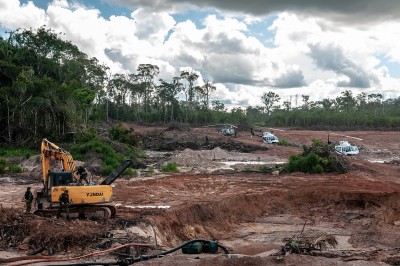Interpol and UNODC Strengthen Global Fight Against Forestry Crime with Norway's Support
In a bid to combat forestry crime on a global scale, an international coalition spearheaded by Interpol and the United Nations Office on Drugs and Crime (UNODC) supported by Norway has inaugurated the second stage of a revolutionary initiative, LEAP II.
 Brazilian environmental police agents fighting illegal logging in Indigenous territory, 2018 / Picture: © Wikimedia Commons/ Ibama/ CC BY-SA 2.0 (https://creativecommons.org/licenses/by-sa/2.0)
Brazilian environmental police agents fighting illegal logging in Indigenous territory, 2018 / Picture: © Wikimedia Commons/ Ibama/ CC BY-SA 2.0 (https://creativecommons.org/licenses/by-sa/2.0)
This refreshed initiative, backed by Norway's International Climate and Forest Initiative, underscores the importance of an intelligence-driven approach. It champions the collaboration of multiple agencies and the infusion of cutting-edge law enforcement techniques. Targeting Latin America and Southeast Asia, LEAP II is designed to assist nations in combating forestry crimes and curtailing illegal deforestation in tropical zones.
What is LEAP?
LEAP's primary goal is to thwart international crime syndicates, ensuring the preservation of global forests. The second phase is poised to build on the achievements of the first, which bore fruit in identifying illicit timber supply chain activities. This helped in unmasking and disrupting global criminal rings associated with forest-related felonies.
Interpol's vast database and intelligence resources will be harnessed by frontline officers to zero in on potential criminals, keep an eye on the flow of guarded merchandise, and pinpoint dubious companies across varied legal domains. Highlighting the gravity of the situation, Interpol Secretary General, Jürgen Stock, stated, "Our planet is being pillaged by criminals reaping massive illegal profits. To truly curb this global menace, we need a united front, integrating law enforcement, multiple agencies, and the private sector."
The first LEAP phase resulted in the confiscation of over 500 tonnes of unlawful timber and dismantled numerous criminal networks, making significant arrests globally.
Forestry Crime is serious
Forestry crime, including illegal logging and related activities, poses significant environmental, social, economic, legal, and reputational threats.
Forestry crime leads to biodiversity loss, contributes to climate change, disrupts water cycles, causes soil erosion, and destroys natural habitats. Social implications concern mainly indigenous communities, which are displaced, and health risks arise as deforestation can spread diseases.
Governments lose revenue from unpaid taxes on illegal timber, global timber prices drop, and local livelihoods are at risk. Forestry crime fosters corruption, weakens the rule of law, and attracts organized crime. Companies and countries involved risk damaging their global reputation and facing boycotts or sanctions.
From environmental degradation to economic challenges, forestry crime has wide-ranging negative effects. Ghada Waly, the UNODC Executive Director, emphasized the dangers of unchecked deforestation. She said, "Criminals have exploited our rainforests too long, jeopardizing our climate, biodiversity, and public health." Waly is optimistic that LEAP's renewed phase will play a pivotal role in conserving rainforests for the future.
Espen Barth Eide, Norway’s Minister of Climate and Environment, elaborated on the dangerous backdrop of illegal logging. Behind the scenes, influential individuals and networks capitalize on deforestation, often converting these spaces for illicit farming or mining ventures.
Underpinning the LEAP initiative, between 2018 and 2022, was the goal of fostering partnerships with global law enforcement bodies, laying the groundwork for a sustainable battle against organized forest crimes. The next phase, LEAP II, promises an expanded purview, incorporating related crimes like money laundering, corruption, and drug trafficking into its mandate.
The kickoff of LEAP II coincides with the launch of the Nature Crime Alliance (NCA) at the Global Environment Facility in Vancouver. Interpol, an integral launch partner of NCA, believes this multi-sector global network will magnify efforts to combat environmental crimes by bolstering political resolve, rallying financial support, and enhancing operational capabilities.



